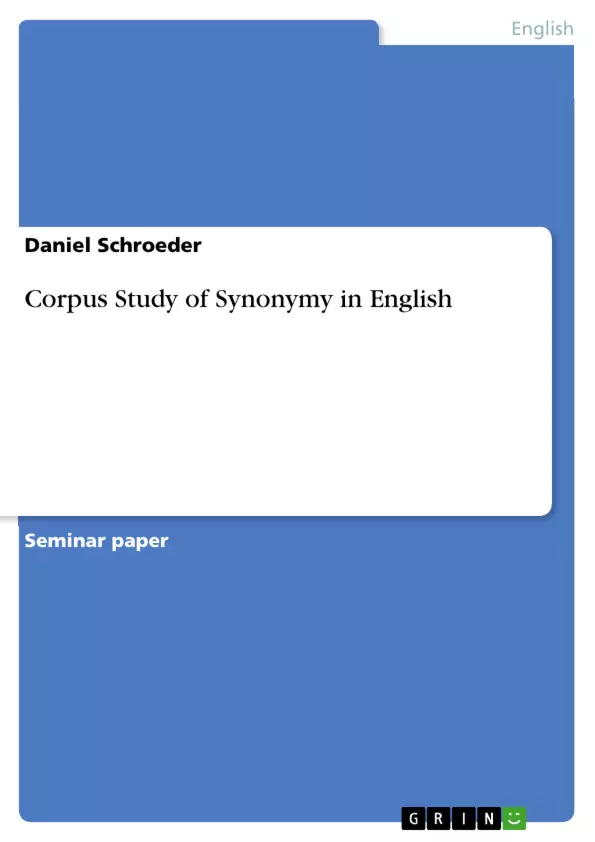“Similarity of meaning is “the most important lexical relation” in the WordNet model, and, in philosophy, Quine has identified synonymy (along with analyticity) as “the primary business of the theory in meaning.”
When writing a text about any topic, one does not want to use the same word every time. Imagine, the task is to write an article about young people. At first, they are called youth, but then the word adolescent is chosen. These two words are known to be synonyms, but it can be shown that words in English cannot have identical meaning and always are different in some way.
The question in this example is, whether youth and adolescent are fully interchangeable.
They are synonymous, because the OED, for example, defines synonyms as words that have the “same general sense[…]”, but they have “different shades of meaning or implications appropriate to different contexts[…]”.
When thinking about the German erledigen, one finds a lot of words in English that should be considered in a translation, like to attend, to settle, to handle, to do, to finish, to dispatch etc.
Some of them are used in different situations or have the same core meaning, but differ in “[…]minor ways, or in emotional and stylistic connotation.”
This seminar paper will focus on the analysis of synonymous words and sentences. Based on the notion that identity means “oneness” , it must be understood that a perfectly identical meaning can therefore not exist between two or more synonymous words or sentences.
This seminar paper does not aim to prove that words can have the same sense in some cases. It is rather based on the theory that they only have identical meaning, if it is similar in all contexts. This would be valid, if words like youth and adolescent differed only in form. The objective is to show, by using the British National Corpus (BNC) and other thesauruses, what distinctions random synonyms such as these may have and why they cannot be easily interchanged.
Table of Contents
- Introduction
- Comparison of synonymous words and sentences in English
- Stylistic differences
- Differences in connotation
- Differences in affect
- Difference in regional usage
- Collocational differences
- Differences in grammatical usage
- Difference in logical semantic usage
- Differences in general use
- Differences in tone
- Differences in frequency
- Conclusion
- Bibliography
Objectives and Key Themes
This seminar paper investigates the nature of synonymy in English, focusing on the analysis of synonymous words and sentences. The objective is to demonstrate that perfect synonymy, where two words or sentences have identical meaning in all contexts, is unattainable. The paper aims to achieve this by exploring the various distinctions between synonymous words and sentences, showing why they are not easily interchangeable.
- Stylistic differences between synonymous words and their influence on register
- The role of connotation in differentiating the meaning of synonyms
- The impact of collocation on synonymous words and sentences
- The analysis of synonymy through the use of the British National Corpus (BNC) and other thesauruses
- The importance of understanding synonymy for effective communication and translation
Chapter Summaries
- Introduction: The chapter introduces the concept of synonymy and its importance in lexicology. It highlights that while synonyms share a general sense, they often differ in nuances of meaning, connotations, and stylistic appropriateness.
- Comparison of synonymous words and sentences in English: This chapter focuses on various distinctions between synonymous words and sentences, exploring how these differences impact their usage and meaning. It examines factors such as stylistic differences, connotations, collocations, and frequency of use, providing examples to illustrate the analysis.
- Stylistic differences: This section explores the impact of formal and informal language on the choice of synonyms. It argues that synonymous words can often be used in different registers and that their interchangeability depends on the specific context and desired level of formality.
- Differences in connotation: This section delves into the concept of connotation, the additional meaning associated with a word beyond its core meaning. It shows how synonyms can have similar core meanings but differ in their connotations, leading to subtle variations in meaning and interpretation.
Keywords
This seminar paper focuses on the analysis of synonymy in the English language. The key terms and concepts explored include: synonymy, denotation, connotation, register, formality, informality, collocation, British National Corpus (BNC), thesaurus, and semantic distinctions. The paper aims to demonstrate how these factors contribute to the complexity of synonymy and the challenges of achieving perfect interchangeability between synonyms.
Frequently Asked Questions
Can two words have perfectly identical meanings?
No. The paper argues that perfect synonymy (oneness of meaning) is unattainable because words always differ in connotation, style, or context.
What is the difference between "youth" and "adolescent"?
While they share a core meaning, they differ in register and tone. "Youth" can be more general or collective, while "adolescent" often has a more biological or psychological connotation.
How do stylistic differences affect synonyms?
Synonyms often belong to different registers (formal vs. informal). Choosing the wrong synonym can make a text sound inappropriately stiff or overly casual.
What are collocational differences?
Collocation refers to how words naturally pair together. Two synonyms might not be interchangeable because one sounds "right" with a certain noun while the other does not (e.g., "fast food" vs. "quick food").
How is the British National Corpus (BNC) used in this study?
The BNC is used to analyze real-world usage data, showing the frequency and typical contexts of synonymous words to identify subtle distinctions.
Why is understanding synonymy important for translation?
A single word in one language (like German "erledigen") can have many English equivalents (finish, settle, handle). Selecting the right one depends on the specific emotional and stylistic nuances required.
- Citation du texte
- MA Daniel Schroeder (Auteur), 2011, Corpus Study of Synonymy in English, Munich, GRIN Verlag, https://www.grin.com/document/284375



